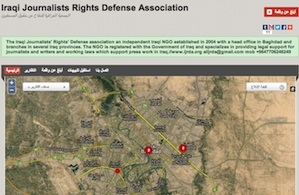

With 151 killings of journalists since 1992, including 93 unresolved murders, Iraq remains one of the most dangerous places to work in news.
To track attacks on journalists in the country, Ibrahim Alsragey, an Iraqi reporter who directs the Baghdad-based Journalists Rights Defense Association, recently launched an online map. The map allows people who witness an attack to report it on the site and highlight its location.
Alsragey hopes the map will counteract what he perceives as a lack of interest from international organizations about the danger journalists face in Iraq and the Iraqi government’s lack of will to stop the attacks. He hopes the map can help “expose those behind the attacks and also identify the danger zones” for journalists.
The map was inspired by the work of investigative journalist and ICFJ Knight International Journalism Fellow Jorge Luis Sierra. Sierra built “Periodistas en Riesgo” (“Journalists at Risk”) to track attacks on reporters in Mexico. The project was recently nominated for the Dutch government’s Human Rights Innovation Award, and attracted the interest of the U.S. Institute of Peace and U.S. Department of State, which invited Sierra to participate in its TechCamps around the world.
When Alsragey attended Sierra’s session at a U.S. Institute of Peace-sponsored TechCamp in Erbil, Iraq, he knew he wanted to create a similar map for journalists in his country. “Ibrahim showed a lot of interest when I showed the map of attacks on Mexican journalists and bloggers,” Sierra told IJNet. “We started to build the Iraqi map immediately.”
Read more about the map on IJNet.
The International Journalists' Network, IJNet, keeps professional and citizen journalists up to date on the latest media innovations, online journalism resources, training opportunities and expert advice. ICFJ produces IJNet in seven languages: Arabic, Chinese, English, Persian, Portuguese, Russian and Spanish. IJNet is supported by donors including the John S. and James L. Knight Foundation.